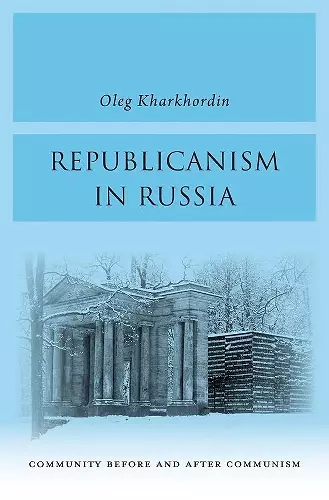Republicanism in Russia
Community Before and After Communism
Format:Hardback
Publisher:Harvard University Press
Published:30th Nov '18
Currently unavailable, and unfortunately no date known when it will be back

If Marxism was the apparent loser in the Cold War, it cannot be said that liberalism was the winner, at least not in Russia. Oleg Kharkhordin is not surprised that institutions of liberal democracy failed to take root following the dissolution of the Soviet Union. In Republicanism in Russia, he suggests that Russians can find a path to freedom by looking instead to the classical tradition of republican self-government and civic engagement already familiar from their history.
Republicanism has had a steadfast presence in Russia, in spite of tsarist and communist hostility. Originating in the ancient world, especially with Cicero, it continued by way of Machiavelli, Montesquieu, Tocqueville, and more recently Arendt. While it has not always been easy for Russians to read or write classical republican philosophy, much less implement it, republican ideas have long flowered in Russian literature and are part of a common understanding of freedom, dignity, and what constitutes a worthy life. Contemporary Russian republicanism can be seen in movements defending architectural and cultural heritage, municipal participatory budgeting experiments, and shared governance in academic institutions. Drawing on recent empirical research, Kharkhordin elaborates a theory of res publica different from the communal life inherited from the communist period, one that opens up the possibility for a genuine public life in Russia.
By embracing the indigenous Russian reception of the classical republican tradition, Kharkhordin argues, today’s Russians can sever their country’s dependence on the residual mechanisms of the communist past and realize a new vision for freedom.
A fascinating study, empirically informed but normatively oriented, of Russia’s republican prospects. It is imaginatively shaped by political theory, the history of ideas, and a multiply-documented belief in the power of words to change things. -- Philip Pettit, Princeton University and Australian National University
Kharkhordin argues that Russia has a tradition of ‘republican thought’ of a distinct genealogy, not that of the French Revolution but originating in the ancient world (especially Cicero) and then charting its own line through the Russian Decembrists of the early nineteenth century up to the present. These ideas were frequently submerged in the Russian history of authoritarianism, but survived through the medium of literature throughout the later nineteenth century and during the Soviet era. Recouped, they could form the basis for a new politics in Russia. This is original thinking of the first order, and enjoyable reading too. -- Caroline Humphrey, University of Cambridge
This is a brilliant, highly original, and ambitious book. Kharkhordin sets out an agenda for the creation in Russia of a meaningful social order constituted around res publica, cleverly anchoring this vision in a deeply historically grounded analysis that marries multiple Russian intellectual traditions with classical elements of republican thought. The result is a philosophical foundation for an alternative way forward in Russian politics. Breaking new ground amidst rigid analytical paradigms and highly politicized debates, this is a remarkable achievement. -- Jessica Pisano, The New School for Social Research
A startling synthesis of empirical data, conceptual and social history, and political theory. Most commentators examine Russian transformation through the prism of western models of liberalism. Kharkhordin, in contrast, derives a novel theory of Russian republicanism from observation of the practices, language, and histories of Russian activists, poets, politicians, thinkers, and entrepreneurs. This leads him to cautious optimism that new spheres of liberty and public life may yet emerge from areas in Russian society that typically escape our attention: practices of friendship, institutions of the commons, cultures of scientific innovation, and shared desires to remake the world. -- Kevin M. F. Platt, University of Pennsylvania
Kharkhordin’s argument is novel and deeply grounded in the history of ideas and community in Russia…Sews together a set of complex ideas to demonstrate that liberal democracy is not the only option for Russian society to have representative governance. -- Kathryn Stoner * Russian Review *
ISBN: 9780674976726
Dimensions: unknown
Weight: unknown
320 pages